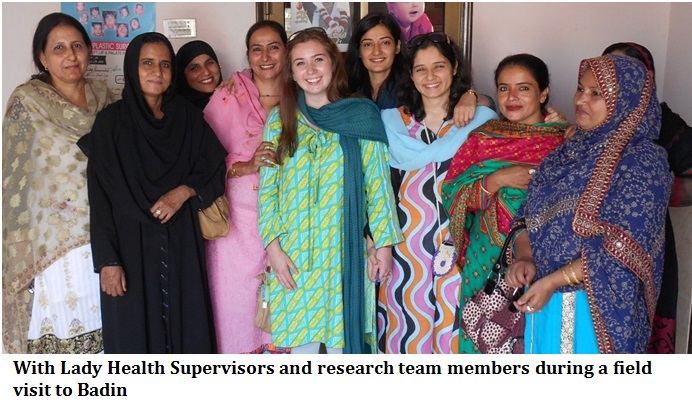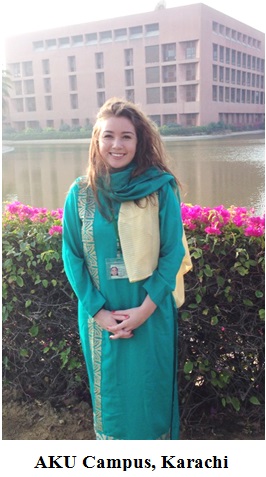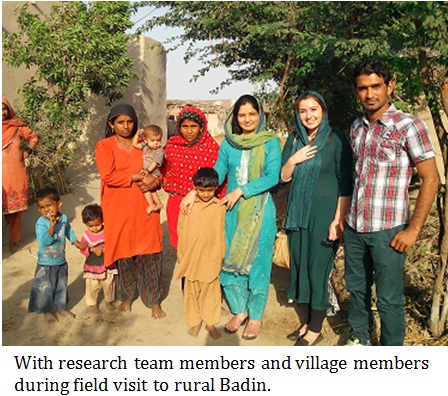
At the close of my fourth working week as a public health intern for the Community Health Sciences Faculty at Aga Khan University, a community leader asked my thoughts of Pakistan thus far, and I stumbled through an answer well shy of any substantial insight. I’ve yet to synthesize my native Canada to a few sentences, so I found myself stunted, incapable of simplifying the short-earned wealth of knowledge I’ve gathered about Pakistan into a remotely sensible response. However, my past travels rightly point out, that observations and conversations rooted in new experiences extend indefinite learning, so my answer to his inquiry will inevitably evolve. Typical isn’t it though, that the most expected of questions renders speechless resolve?
 I’ve long tended my personal and professional focus to global health and humanitarian issues. As a recent graduate of the Bachelor of Health Sciences program at the University of Calgary, understanding how academia and research translate into practice in low and middle-income countries is of utmost priority to ensure I endeavor for a Masters of Public Health equipped with greater comprehension of the complexities which accompany addressing global and humanitarian issues. Aga Khan University, an agency of the Aga Khan Development Network, is widely regarded for its global health contributions, so I am immensely grateful to exchange my skill set for an in-depth learning experience that contributes to a shared vision.
I’ve long tended my personal and professional focus to global health and humanitarian issues. As a recent graduate of the Bachelor of Health Sciences program at the University of Calgary, understanding how academia and research translate into practice in low and middle-income countries is of utmost priority to ensure I endeavor for a Masters of Public Health equipped with greater comprehension of the complexities which accompany addressing global and humanitarian issues. Aga Khan University, an agency of the Aga Khan Development Network, is widely regarded for its global health contributions, so I am immensely grateful to exchange my skill set for an in-depth learning experience that contributes to a shared vision.
I arrived in Karachi with two main worries - being of use during my internship and building substantial friendships to deter loneliness during my 10-month stay. Both worries have subsided comfortably upon influx of projects and welcoming colleagues and peers. Under the supervision of Dr. Fauziah Rabbani I have begun work on numerous projects and joined a research team within the Community Health Sciences Faculty. I’m plentiful with opportunities to learn the complexities of public health provision in rural and urban areas of Pakistan, and feel capable of making realistic contributions to each project. Conversation is readily available, being that I stir curious inquiry nearly everywhere I go on campus. But good conversation, such that fuels curiosity and inspires endless avenues of exploration and self-reflection, I’ve found with a number of colleagues, fellow expats, and peers at women’s residence. If my youth grants the naivety and energy to engage with the most complex of issues, then I am happy to shape my learning with every form of education available during my internship.
Aga Khan University operates as a city, catering all necessary amenities - from water filtration to health services to banking, mitigating the chaos of Karachi to create the ‘bubble’ necessary to teach and research in a context riddled with security concerns and afflicted by fragile systems. I’ve welcomed opportunities to tour the movie, shopping, and restaurant entertainment that Karachi has to offer, and juxtaposed those outings with visits to urban squatter settlements for introduction to community members and leaders with which my projects are partnered. A two-day field visit to Badin in rural Pakistan showcased the logistical difficulties of conducting research in low-resource settings, and accentuated the importance of team morale and collaboration for effective data collection and implementation. I joined the frontline research processes at a district health office, publically funded secondary hospital, and village community, accumulating observations and insights for deeper contemplation and eventual integration into my global health and humanitarian perspectives. These field visits are pivotal learning opportunities, as they provide me a clear visual and experiential benchmark from which to gauge the feasibility and impact potential of research, policy, and programming in challenging contexts. Academically, I can provide a full list of issues these rural and urban settlements manifest: poor sanitation infrastructure and water quality, food insecurity, minimal educational and employment opportunities, limited access to health services, compounding infectious and non-communicable disease, challenges in family planning, restrictive cultural norms, mental health disorders, and looming vulnerability to security threats.
 The point of my coming to Pakistan was to delve beyond an academic understanding of such issues, and having traveled previously in East Africa and Central/South America, witnessing these issues was not shocking. It is through candid discussion with community members and focused observation that the enormity and claustrophobic layering of issues stumps logical analysis and introduces humble contemplation. It reaffirms that addressing health issues and their complicated causes is profoundly difficult when attempted in silos; accentuating the importance of multifaceted partnership for devising comprehensive and appropriate solutions worthy of implementation.
The point of my coming to Pakistan was to delve beyond an academic understanding of such issues, and having traveled previously in East Africa and Central/South America, witnessing these issues was not shocking. It is through candid discussion with community members and focused observation that the enormity and claustrophobic layering of issues stumps logical analysis and introduces humble contemplation. It reaffirms that addressing health issues and their complicated causes is profoundly difficult when attempted in silos; accentuating the importance of multifaceted partnership for devising comprehensive and appropriate solutions worthy of implementation.
Traveling has always emphasized my sense of social responsibility, and rendered me the companionship and adventure necessary to motivate direction and fuel dedication. I’m confident my time in Pakistan will continue this pattern and ignite further inquiry.

